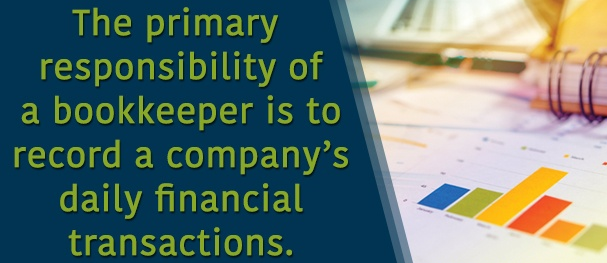Whether you sell baseball cards, baseballs, or tickets to a baseball game, your business still needs a bookkeeper or an accountant, or ideally, both.
Though bookkeeping and accounting are two terms frequently used interchangeably, they are different. A bookkeeper’s responsibilities are mainly transactional, gathering and entering financial transactions. By contrast, an accountant’s responsibilities are analytical and focus on financial performance, using that information to help you better manage your business.
While accounting software has played a huge role in automating the bookkeeping and accounting processes, it’s still helpful for small business owners to understand the similarities and differences between the two.
What is bookkeeping?
Bookkeeping focuses on the proper recording of financial transactions for your business. Usually, your bookkeeper would use double-entry accounting to record all your financial transactions. Double-entry accounting means that for every debit entry you make, a corresponding credit entry must be made.

While they mainly record financial transactions, bookkeepers are responsible for a variety of duties, which are important for maintaining a successful business.
• Organize and categorize transactions: This includes reviewing incoming bills for accuracy and preparing them for payment.
• Write invoices: It’s impossible to get paid if your customers never receive an invoice. Bookkeeper responsibilities include tracking sales and writing invoices for goods and services provided.
• Pay bills: Small businesses need to maintain a good relationship with their vendors, which is why paying bills by their due date is so important.
• Record customer payments: Recording customer payments promptly ensures that your accounts receivable balance is accurate and that you don’t send a past-due notice to a customer when they’ve already paid.
• Maintain petty cash: With company credit cards, a petty cash account isn’t as important as it once was, but if your company still has one, it’s the bookkeeper’s job to ensure that the funds are managed and disbursed properly.
• Reconcile bank statements: An often overlooked task, regularly reconciling bank statements reduces potential errors and provides you with an accurate bank balance each month.
• Enter month-end adjusting entries: While bookkeeping software has reduced the number of journal entries needed, there are likely to be month-end adjusting entries needed to account for expenses such as depreciation, interest expenses, bank charges, and other items that may have been skipped.
• Prepare financial statements: While it’s the job of an accountant to analyze financial statements, it’s often the bookkeeper’s job to prepare financial statements on a monthly, quarterly, or annual basis, depending on company needs.
Bookkeepers can also be responsible for other tasks such as reviewing expense reports and assisting in preparing a budget. A bookkeeper’s job is an important element for any small business, and it shouldn’t be underestimated.
What is accounting?
Sometimes, the job of an accountant can overlap that of a bookkeeper. However, while the bookkeeper’s job is usually centered on transaction entry, the accountant’s is to analyze the information recorded by the bookkeeper, using accounting principles.

The top accounting functions performed by accountants include the following:
Preparing financial statements:balance sheet
Analyzing revenue and costs:general ledger
Taxes:
Financial planning:
Bookkeeping vs. accounting: What are the main differences?
Bookkeeping and accounting are both essential to your small business. While both deal with financial transactions, bookkeeping centers on the organization and recording of financial transactions, while accounting analyzes those financial transactions and their impact on your business.
Both bookkeeping and accounting use the accounting equation Assets = Liabilities + Equity, considered the foundation of the double-entry accounting system.
But as similar as the two may appear, there are major differences.
| Organizes and records financial transactions | Reviews financial statements and general ledger balances | ||||||||||||||||||||
| Creates invoices and posts payments | Prepares adjusting and closing entries for bookkeepers | ||||||||||||||||||||
| Reconciles bank statements | Runs accounting ratios to determine profitability, debt, and income | ||||||||||||||||||||
| Is more concerned with day-to-day activity | Is more concerned with the big picture | ||||||||||||||||||||
| Handles month-end closing | Handles all tax returns and tax planning | ||||||||||||||||||||
| Runs financial statements | Creates forecasts and budgets |
Does your small business need a bookkeeper or an accountant?
Ideally, it would have both. Most small businesses can get by in the early stages using a bookkeeper, and that may be sufficient for managing day-to-day activity. In many cases, a skilled bookkeeper can perform many of the same tasks an accountant would. However, it’s always a good idea to have an accountant to review entries, look at cash flow, and provide any feedback on the performance of your business, including cost-cutting measures and other suggestions.
Bookkeeping and accounting are both important
While having an adequate bookkeeping system in place may be sufficient for many small businesses, it does not diminish the importance of an accountant.
There’s a place for both bookkeeping and accounting in your small business, and as a small business owner, you’ll likely be called upon to be both at one time or another. While accounting software certainly makes the bookkeeping process a lot easier, it requires a different set of skills and knowledge to handle accounting for your business.
In either case, familiarizing yourself with bookkeeping terms and accounting basics can certainly go a long way toward making the process easier.
The post Bookkeeping vs. Accounting: A Small Business Guide to the Differences appeared first on The blueprint and is written by Mary Girsch-Bock
Original source: The blueprint






